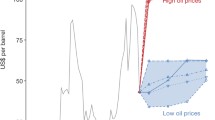Abstract
Fossil fuel subsidies are applied in many countries for different policy reasons such as maintaining jobs in fossil fuel sectors, securing national energy supply or lowering the energy costs of selected industries to strengthen competitiveness. The current economic costs of fossil fuel subsidy policies can be substantially increased by future environmental constraints. We illustrate this point in the framework of a general equilibrium analysis for Germany where we quantify the economic costs of alternative hard coal subsidy policies at different CO2 reduction levels. Our calculations show that German hard coal subsidies as a means of retaining jobs can get very expensive with additional specific costs of up to annual 70 000 DM per job for a given CO2 reduction target of 35%. Though the empirical analysis is focused on Germany the general conclusion that current subsidy policies of fossil fuels must be fundamentally reconsidered in view of forthcoming environmental constraints is also relevant for other countries.
Similar content being viewed by others
References
BMU (1990), Bundesministerium für Umwelt, Pressemitteilung 114/90.
BVG, Bundesverfassungsgericht, Zweiter Senat (1995), ‘Zur Verfassungswidrigkeit des Kohlepfennigs’, Energiewirtschaftliche Tagesfragen 3, 182–184.
Böhringer, C. and T. F. Rutherford (1996), ‘Carbon Taxes with Exemptions in an Open Economy — A General Equilibrium Analysis of the German Tax Initiative’, Environ. Econ. Management, Stuttgart/Boulder (forthcoming).
Conrad, K. and M. Schröder (1991), ‘The Control of CO2 Emissions and its Economic Impac’, Environ. Res. Econ. 1, 289–312.
Conrad, K. and J. Wang (1993), ‘Quantitative Umweltpolitik: Gesamtwirtschaftliche Auswirkungen einer CO2 Besteuerung in Deutschland (West)’, Jahrbücher für Nationalökonomie und Statisik.
Gerken, E. et al. (1985), ‘Mehr Arbeitsplätze durch Subventionsabbau’, Kieler Diskussionsbeiträge, Institut für Weltwirtschaft, Kiel.
Hamm, R. and K.-H. Storchmann (1992), ‘Steinkohlenbergbau im Ruhrgebiet’, RWI-Papiere 30, Essen.
Löbbe, K. and R. Reittig (1985), ‘Zur volkswirtschaftlichen und arbeitsmarktpolitischen Bedeutung des Steinkohlenbergbaus’, RWI, Essen.
Perroni, C. and T. F. Rutherford (1995), ‘Regular flexibility of nested CES functions’, Europ. Econ. Rev. 39, 335–343.
Rutherford, T. F. ‘Applied General Equilibrium Modelling’, dissertation, Department of Operations Research, Stanford.
Rutherford, T. F. (1988), ‘Applied General Equilibrium Modelling’, dissertation, Department of operations Research, Stanford.
Rutherford, T. F. (1995), ‘Extensions of GAMS for Complementarity Problems arising in Applied Economic Analysis’, forthcoming: J. Econ. Dynam. Control.
Schiffer, H.-W. (1994), ‘Energiemarkt Bundesrepublik Deutschland’, Köln, 96–98.
Schröder, M. (1991), ‘Die volkswirtschaftlichen Kosten von Umweltpolitik’, Heidelberg, 14–43.
Statistisches Bundesamt, Volkswirtschaftliche Gesamtrechnungen, Fachserie 18, Reihe 2, Input-Output-Tabellen (1986, 1988, 1990), Wiesbaden, 1994.
Wachendorf, H.-G. (1991), ‘Kohleverstromung in Deutschland’, Elektrizitätswirtschaft, 93-12.
Welsch, H. (1994), ‘Gesamtwirtschaftliche Auswirkungen von Emissionsminderungsstrategien’, in: Enquete-Kommission ‘Schutz der Erdatmosphäre” des 12. Deutschen Bundestages: Schlußbericht, Drucksache 12/8600, Bonn.
Author information
Authors and Affiliations
Rights and permissions
About this article
Cite this article
Böhringer, C. Fossil fuel subsidies and environmental constraints. Environmental and Resource Economics 8, 331–349 (1996). https://doi.org/10.1007/BF00339081
Accepted:
Issue Date:
DOI: https://doi.org/10.1007/BF00339081




